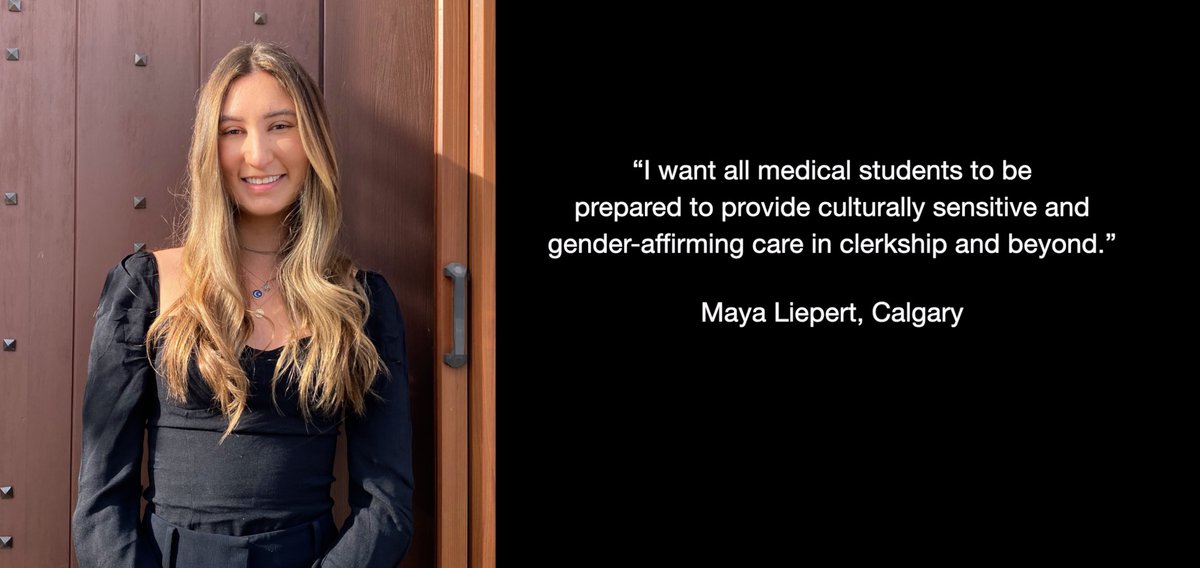Maya Liepert is a caring and engaged member of the Tanuki Medical School class of 2022 at Cumming School of Medicine. In her role as co-chair of Medical Students for Gender and Sexual Diversity (GSD), she supports team communication and coordination, engagement with key stakeholder groups such as school administration, and content development for school curriculum.
Maya has a vision that everyone should feel engaged and accepted when receiving medical care. When speaking about the importance of accessible, supportive treatment for gender-diverse patients, Maya shares: “It’s really important to me because I want all medical students to be prepared to provide culturally sensitive and gender-affirming care in clerkship and beyond, and to always be mindful of how we treat our patients, of the language we use and how we can make sure medicine is a safe space for everyone.”

In her role as co-chair, Maya is responsible for creating a welcoming and goal-oriented team culture. She sees the role of the group as providing medical students the opportunity to better understand the perspective of patients who have not always felt embraced in their experiences with health care.
While the group has engaged in a wide range of school initiatives, some stand out for Maya. Accomplishments she feels most proud of are those that will impact medical learners and their future patients. Some initiatives of GSD are new, such as putting together a panel of experts who work with 2SLGBTQ+ youth as additional teaching in the pediatrics course. Other initiatives focus on enhancing and updating existing programming, such as a required gender-affirming care session in which small groups of medial learners work through cases with a physician. While this session has been part of the global health curriculum at the Cumming School of Medicine in the past, Maya worked with a team of doctors, fellow medical students and school representatives for months during the pandemic to update and broaden the session focus.
Maya has long been interested in health challenges faced by diverse populations. Before attending medical school, she worked on a team in a fall-prevention clinic for high-risk elderly patients. Through this experience, she observed the impact of chronic health conditions on daily living and the ways in which simple interventions could enhance safety.
Maya later supported research in cancer epidemiology and prevention, focusing on breast cancer and the effects of physical activity on various health-related and quality of life outcomes. She had earlier seen the impact of exercise and health through teaching swimming to people with autism and cerebral palsy. These types of experiences highlighted for her the impact of bringing hope to patients and impacted her perspective, as did relationships with friends who felt rejected by a health care system that Maya hoped to join someday as a physician.
After entering medical school, she realized an opportunity to contribute by bringing together her desire to see all people embraced in the health care system with her interest in teamwork and content development. This was when she first sought out a formal role in Medical Students for Gender and Sexual Diversity.
Working with Maya in many contexts in medical school has shown classmate Michael Leslie that she is “a passionate and driven power-house of a human with the characteristics of a true leader,” who in a short time has already “made an impressive impact in promoting and educating classmates on gender-affirming and culturally competent care, efforts that will have a lasting effect on the future delivery of medical care and more importantly will improve the experiences of the patients served by the medical system. I am truly in awe of the things that Maya has accomplished thus far and am excited to see what she has in store for the future.”
Maya is a great example of moving from passion to action at medical school. Classmate Emily Williams notes: “Maya is a true pleasure to have as a colleague and regularly sets an outstanding example for those around her. Maya has the gift of identifying areas for improvement and growth, coupled with the courage to speak up and act on her values. I am consistently impressed by her character and conviction in standing up for what is right and have witnessed Maya regularly, in large and small settings, set a strong example of inclusivity and advocacy. This is no small feat when one considers the setting and traditional hierarchy of medicine. I have no doubt her career and future impact will resonate with generations to come in terms of changing the culture of medicine for the better.”
Now on the path to her dream role as a physician, Maya is already having an impact.
